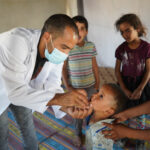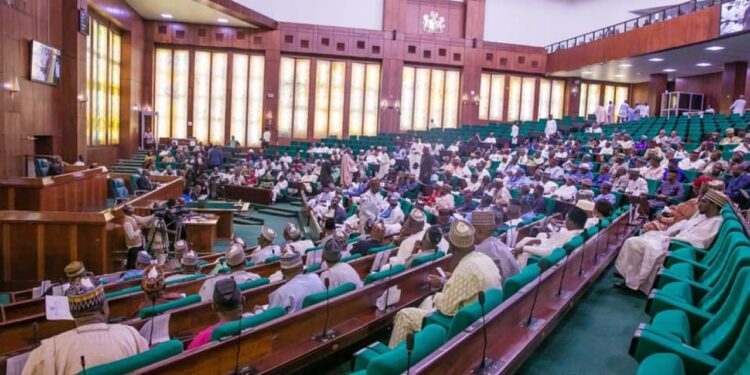
“CBN Confirms No Plans to Discontinue Circulation of Old N200, N500, and N1,000 Banknotes by December 31, 2024”
October 25, 2024
Urgent Vaccination Campaign Launched in Pakistan Amid Surge in Polio Cases
October 25, 2024House of Representatives Calls on CBN to Allocate Additional $3 Billion for Agricultural Financing


Hon. Uchenna Okonkwo, a member of the House of Representatives, during the plenary session on Tuesday, highlighted the pressing need for increased funding in agriculture to boost the nation’s economy by urging the Central Bank of Nigeria (CBN) to address the severe underfunding in the agricultural value chain by allocating an additional $3 billion to the Nigeria Incentive-Based Risk Sharing System for Agricultural Lending (NIRSAL).
Hon. Okonkwo emphasized the critical state of Nigeria’s economy, attributing widespread poverty and hunger to declining agricultural productivity. He pointed out that the low capital investment in agriculture, compounded by insufficient financial support for agricultural production, has exacerbated these challenges. In his view, reviving Nigeria’s agricultural sector would require a significant infusion of funds, which would in turn improve productivity and alleviate hunger.
Recalling NIRSAL’s origins, Okonkwo reminded lawmakers that the CBN launched the initiative in 2011 with an initial capital of $500 million. NIRSAL was conceived as a public-private partnership aimed at boosting the agricultural sector by mitigating the risks associated with agricultural lending. The program’s primary goals were to strengthen the agricultural and financial value chains, promote sound agricultural financing practices, and reduce the credit risks for banks lending to agribusinesses. Despite its promise, however, the sector has continued to struggle due to insufficient funding.
The lawmaker expressed concern that the agricultural sector, which accounts for roughly 40% of Nigeria’s Gross Domestic Product (GDP) and provides over 60% of employment, is currently underperforming. Despite its vast potential to drive economic recovery and reduce unemployment, the sector’s growth has stagnated. Okonkwo argued that a key reason for this stagnation is the lack of adequate financing, particularly for smallholder farmers who form the backbone of the agricultural workforce.
To reverse this trend, Okonkwo advocated for a significant boost in funding for NIRSAL, recommending an additional $3 billion in capital. This increased funding, he explained, would provide much-needed support to the agricultural value chain actors, helping them overcome financial constraints and improve productivity. He emphasized that expanding the financial reach of NIRSAL would stimulate growth in the sector, which in turn would help address food insecurity and stimulate economic development.
Recognizing the importance of financing to the agricultural sector, the House of Representatives supported Okonkwo’s motion, urging the CBN to significantly increase agricultural lending. The House called on the CBN to raise the proportion of agricultural loans from the current 1.4% of total lending to 7% over the next five years. This increase in lending, lawmakers argued, would be crucial to revitalizing the sector and ensuring that it reaches its full potential.
Moreover, the House stressed the importance of prioritizing smallholder farmers in this increased lending. It recommended that the CBN ensure that at least 50% of all agricultural loans be directed toward smallholder farmers through microfinance institutions (MFIs), farmer cooperatives, and commodity associations. By focusing on these key players in the agricultural value chain, the CBN would be addressing the root causes of underperformance in the sector. The House also suggested that interest rates on these loans be set at between 7.5% and 10.5%, making them more affordable and accessible to small-scale farmers.
The motion did not stop at recommending increased lending; it also addressed the need for better oversight and compliance. The House mandated its Committees on Banking Regulations, Agricultural Production and Services, Nutrition and Food Security, and Finance to monitor the implementation of these recommendations. These committees were tasked with reporting back to the House within four weeks, ensuring that legislative oversight plays a key role in driving the CBN’s compliance with the new directives.
The call to action reflects a growing recognition of the critical role that agriculture plays in Nigeria’s economy. Despite accounting for a substantial portion of GDP and employment, the sector has struggled to grow in recent years due to a lack of financial support. By addressing the chronic underfunding of agriculture, lawmakers hope to reverse the current downward trend and unlock the sector’s potential to drive economic recovery, reduce poverty, and improve food security.
Furthermore, increasing financing for agriculture is not only seen as a short-term solution but also a long-term strategy for sustainable economic development. The additional $3 billion proposed for NIRSAL would enable more farmers to access credit, invest in modern farming practices, and increase productivity. This, in turn, would have a multiplier effect across the economy, boosting job creation and contributing to greater food self-sufficiency.
In a broader context, the House’s recommendations are part of a larger effort to ensure that key sectors, like agriculture, receive the attention and funding they need to support Nigeria’s long-term economic goals. As the country faces growing challenges in terms of food security, unemployment, and economic stagnation, targeted investments in agriculture could provide the catalyst needed for a broader economic recovery.
In conclusion, the House of Representatives has made a strong case for the CBN to increase its financial support to the agricultural sector. By allocating additional funds to NIRSAL, ensuring that a significant portion of loans reaches smallholder farmers, and setting more favorable loan terms, Nigeria can begin to unlock the full potential of its agricultural sector and drive long-term economic growth.

